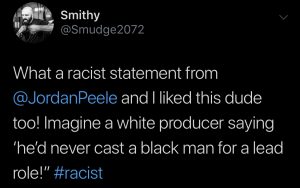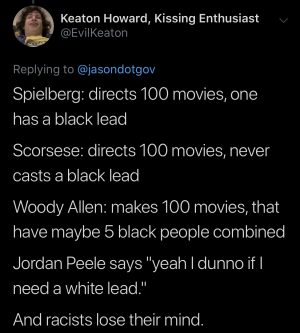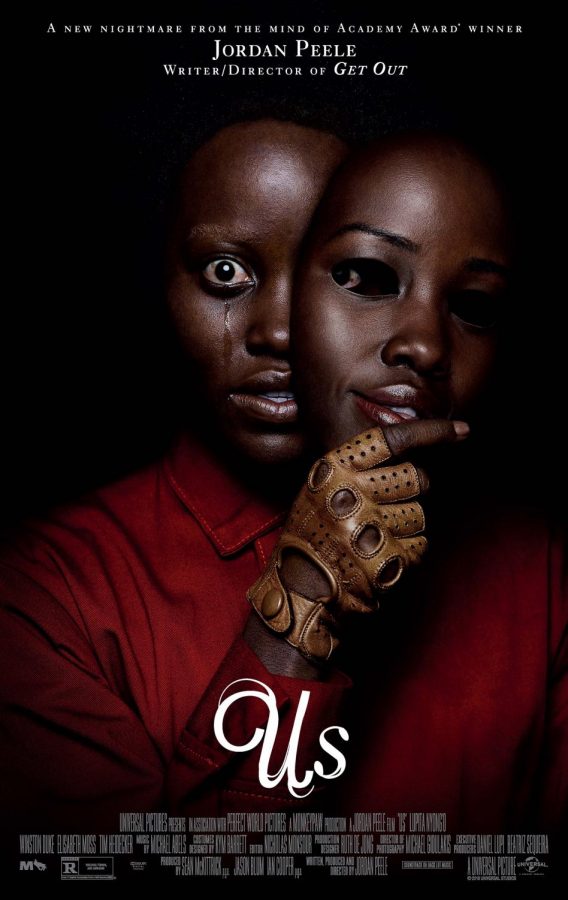It’s Time for ‘Us’ to Shine
Jordan Peele’s new movie ‘Us’ receives a positive welcome from anticipated viewers.
April 9, 2019
With a massive grand opening, Jordan Peele’s new movie Us garnered $100 million dollars in its first debut weekend. Following the theme of horror mixed with covert social messages first presented in his breakout movie Get Out, Us is about a family that has to fight off their evil doppelgangers, according to Forbes.
In both movies, it is clear that the main characters are always casted by black actors and actresses. Jordan Peele has stated, “I don’t see myself casting a white dude as the lead in my movie. It’s not that I don’t like white dudes. But I’ve seen that movie.”
Many people, mostly white, were enraged by his comment, claiming Peele is racist and close-minded to the idea of having a white lead in his movies. But is he?

 For those that are angry, it really isn’t that deep. As long as movies have been around, the industry has been dominated by white leads in every type of film. When it comes to diversity, however, the horror genre has always been disappointing. Black characters are typically casted as comic relief and are often the first to die, likely because their characters are dispensable for the plot. Jessica Vo (Former Student) laughs at all the “dumb personalities movie directors enforce upon black characters” because “everybody knows black people are the first to run away from suspicious activity. They’re not stupid.”
For those that are angry, it really isn’t that deep. As long as movies have been around, the industry has been dominated by white leads in every type of film. When it comes to diversity, however, the horror genre has always been disappointing. Black characters are typically casted as comic relief and are often the first to die, likely because their characters are dispensable for the plot. Jessica Vo (Former Student) laughs at all the “dumb personalities movie directors enforce upon black characters” because “everybody knows black people are the first to run away from suspicious activity. They’re not stupid.”
Luckily, fans who understood his point of view were quick to defend Peele’s comment. When minorities want more inclusivity in any entertainment production, they are commonly retorted with “make your own.” So Jordan Peele did. As a black director in Hollywood, he has the opportunity and unique position to cast black actors and actresses as lead roles in publicly anticipated movies.
If the public is going to hold Peele accountable for not casting any white leads, then they should not turn their cheek when it comes to famous and well known white directors that have a history of non-people of color leads.


What Jordan Peele is presenting to the public is extraordinary. Not only are his leads black, they are dark-skinned black people, who are even less represented in Hollywood. As of today, society is still fighting for diversity in the entertainment industry. Even when there are black characters in movies, the actors are typically light-skinned, for they are the “accepted” version of “black” in media. Zendaya, an actress, model, producer, fashion designer, and activist, has publicly stated that she will turn down roles meant for darker skinned girls. Instead, according to Huffington Post, she shares, “I always tell my theatrical manager, ‘Anytime it says they’re looking for white girls, send me out. Let me get in the room. Maybe they’ll change their minds.’”
White people typically feel the need to be included in everything, especially when they have already had the opportunities that minorities have not. Black Girl Nerds defend their point of view by saying, “if the movie industry is so diverse, movies like Black Panther and Crazy Rich Asians wouldn’t have been as groundbreaking as they were.”
With that, the movie Us was welcomed with great applause. People can boycott the movie, refuse to support Jordan Peele, and ignore the raw talent of minorities. However, Jordan Peele remains unbothered; he knows that people of color deserve a chance in the spotlight.






































